Meet the CoCreators
Dr. Rosalin Miles
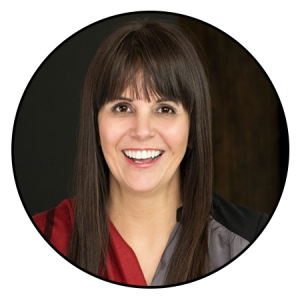 The name of Dr. Rosalin Miles, a Research Associate in the Indigenous Health and Physical Activity program at The University of British Columbia (UBC) School of Kinesiology and a member of the Lytton First Nation, has become synonymous with the promotion of physical activity within Indigenous communities. She practices reciprocity by volunteering in her community and at UBC, where she gives back as an Indigenous Scholar and Mentor.
The name of Dr. Rosalin Miles, a Research Associate in the Indigenous Health and Physical Activity program at The University of British Columbia (UBC) School of Kinesiology and a member of the Lytton First Nation, has become synonymous with the promotion of physical activity within Indigenous communities. She practices reciprocity by volunteering in her community and at UBC, where she gives back as an Indigenous Scholar and Mentor.
Dr. Miles completed her Education, Doctoral Degree, in Curriculum and Instruction, and Exercise Science in 2005, with International Honours, and in 2003, her Graduate Certificate in Non-Profit Management both at the University of Central Florida. She obtained her Master’s degree in Human Kinetics, specializing in Coaching Science, and was the 1st First Nation kinesiologist who graduated from the UBC School of Kinesiology. She has a combined 38 years of experience working in sports, fitness, education, and health as a coach, registered kinesiologist, Active Release Therapist, college and university instructor, researcher, Reiki practitioner, nationally awarded Certified Strength and Conditioning Specialist, and as a national-level athlete.
Dr. Miles is the Founder and volunteer Executive Director of the Indigenous Physical Activity and Cultural Circle (IPACC), with which she has led eight National Indigenous Physical Activity and Wellness Conferences across Canada, and nine Active Spirit Walk and Runs with the Musqueam and the international virtual community. In 2019, she was nominated by Elder and past-Chief Gail Sparrow and was recognized by the House of Commons, Vancouver Quadra’s Hidden Hero Award for her dedication and leadership with the national non-profit IPACC.
In addition, she established four National Strength and Conditioning (NSCA) conferences at UBC, and was the volunteer Provincial Director of the NSCA of B.C. and volunteered as a UBC Strength Coach for the Women’s soccer team for four years. She went on to work in two USA NCAA Athletics programs as Strength and Conditioning Coach. When she returned to Canada she worked at the UBC First Nations House of Learning, and as a School of Kinesiology sessional instructor. She continued her career as an external evaluator of Indigenous organizations for Health Canada before she worked with Lytton First Nation as a Band Administrator. She continues to volunteer as a member of the College of Peer Reviewer of the Canadian Institutes of Health Research. Recently, she served on the 8th International Society for Physical Activity and Health Congress (ISPAH) and was the Chair for the ISPAH Pre-Congress Special Event dedicated to Indigenous Health and Wellness.
Dr. Miles’ role on the current project was as a Subject Matter Expert who authored and created content as well as reviewed other created content.
Mitchell Huguenin
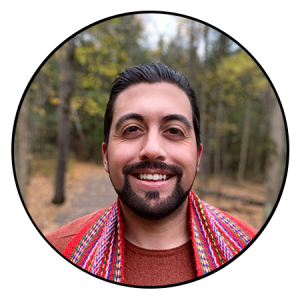 Hailing from Penetanguishene, Mitchell Huguenin is a registered citizen of the Métis Nation of Ontario (MNO) and is a Métis rights-holder from the historic Georgian Bay Métis community (one of seven recognized s.35 rights-bearing Métis communities in Ontario). He is a proud descendant of the Drummond Island Métis, with ancestral ties to the North-West Company at Red River. Mitchell’s upbringing in Penetanguishene encouraged him to proudly identify with the various stories of his people; a privileged position that he believes entails important responsibilities. One is to share these stories with others. To educate about the Métis as well as other Indigenous topics, and – through his roles in higher-education – advance Canada’s national agenda of reconciliation.
Hailing from Penetanguishene, Mitchell Huguenin is a registered citizen of the Métis Nation of Ontario (MNO) and is a Métis rights-holder from the historic Georgian Bay Métis community (one of seven recognized s.35 rights-bearing Métis communities in Ontario). He is a proud descendant of the Drummond Island Métis, with ancestral ties to the North-West Company at Red River. Mitchell’s upbringing in Penetanguishene encouraged him to proudly identify with the various stories of his people; a privileged position that he believes entails important responsibilities. One is to share these stories with others. To educate about the Métis as well as other Indigenous topics, and – through his roles in higher-education – advance Canada’s national agenda of reconciliation.
Mitchell received his certification as a Personal Training Specialist after completing a diploma in Fitness and Health Promotion at Durham College in 2011. Since then, and following further study at Trent University, he developed the first Indigenous-content-centred courses offered at Durham College. With his support, Durham piloted an Indigenous course requirement for all Health and Community Services (HCS) students in 2021. He is currently a part-time instructor both in Trent University’s Chanie Wenjack School for Indigenous Studies and in its School of Education. Mitchell also holds the role of Education Developer for Indigenous Pedagogy in Trent’s Centre for Teaching and Learning.
Mitchell’s role on the current project was as a Subject Matter Expert who authored and created content, reviewed content, and was a liaison with Indigenous Studies at Trent.
Dr. Sarah West
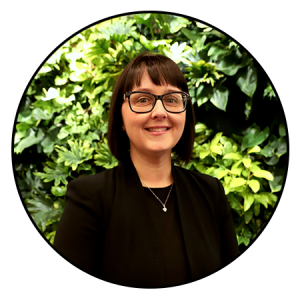 Sarah West (PhD, RKin) is a Registered Kinesiologist and an Associate Professor in Kinesiology and Biology at Trent University. Her area of research focuses on the benefits of physical activity in special populations, including those with chronic disease. She has extensive experience with Kinesiology program and pedagogy development including the creation of multiple required courses for Trent’s B.Sc.Kin degree. Dr. West is an integral member of the team who created and implemented the new B.Sc.Kin degree and Kinesiology Department at Trent University. In addition to her research in physical activity in special populations, Dr. West also focuses on advancing Scholarship of Teaching and Learning (SoTL). Dr. West is a Teaching Fellow with the Trent Centre for Teaching and Learning program which supports faculty as they make substantial, evidence-informed changes to teaching. As a non-Indigenous person from settler-colonial ancestry, she humbly, respectfully, and gratefully acknowledges the opportunity of being involved in this important work.
Sarah West (PhD, RKin) is a Registered Kinesiologist and an Associate Professor in Kinesiology and Biology at Trent University. Her area of research focuses on the benefits of physical activity in special populations, including those with chronic disease. She has extensive experience with Kinesiology program and pedagogy development including the creation of multiple required courses for Trent’s B.Sc.Kin degree. Dr. West is an integral member of the team who created and implemented the new B.Sc.Kin degree and Kinesiology Department at Trent University. In addition to her research in physical activity in special populations, Dr. West also focuses on advancing Scholarship of Teaching and Learning (SoTL). Dr. West is a Teaching Fellow with the Trent Centre for Teaching and Learning program which supports faculty as they make substantial, evidence-informed changes to teaching. As a non-Indigenous person from settler-colonial ancestry, she humbly, respectfully, and gratefully acknowledges the opportunity of being involved in this important work.
Dr. West’s role on the current initiative was project lead, and included leading resource acquisition, helping to coordinate content contributors, administratively supporting development, organizational/logistical assistance, contributing to front and back matter writing as well as content editing.
Stephanie Ferguson
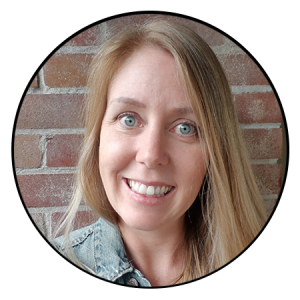 Stephanie is a proud Trent University graduate who fell in love with online learning over a decade ago and has never looked back. For over ten years, she was the Curriculum Development and LMS Lead for the Indigenous e-Channel organization of Ontario where she was passionate about providing access to quality online education in remote northern communities. Stephanie has extensive experience in course design and teaching online using both synchronous and asynchronous platforms. She encourages collaboration and innovation through the use of educational technology in all of the projects she works on as an eLearning Designer with Trent Online.
Stephanie is a proud Trent University graduate who fell in love with online learning over a decade ago and has never looked back. For over ten years, she was the Curriculum Development and LMS Lead for the Indigenous e-Channel organization of Ontario where she was passionate about providing access to quality online education in remote northern communities. Stephanie has extensive experience in course design and teaching online using both synchronous and asynchronous platforms. She encourages collaboration and innovation through the use of educational technology in all of the projects she works on as an eLearning Designer with Trent Online.
Stephanie’s role on the current project was lead eLearning designer, creating the online resource and associated interactive content.
James Bailey
 James is a Multimedia eLearning Design Specialist for Trent Online, joining the team in July 2021. Previously, he gained his experience through freelance work and non-profit video projects after finding a keen interest in the creative and collaborative nature of multimedia design. James is a strong believer in the possibilities of online learning, further enhanced by utilizing industry-leading software and cutting-edge technologies. James works closely with eLearning designers and faculty to develop high-quality multimedia-based course elements that support active learning approaches. A Trent alum, James completed his Bachelor of Arts Honours in Media Studies.
James is a Multimedia eLearning Design Specialist for Trent Online, joining the team in July 2021. Previously, he gained his experience through freelance work and non-profit video projects after finding a keen interest in the creative and collaborative nature of multimedia design. James is a strong believer in the possibilities of online learning, further enhanced by utilizing industry-leading software and cutting-edge technologies. James works closely with eLearning designers and faculty to develop high-quality multimedia-based course elements that support active learning approaches. A Trent alum, James completed his Bachelor of Arts Honours in Media Studies.
James’ role on the current project was to assist with graphic development and contributing to creation of interactive content design.
Jacob van Haaften
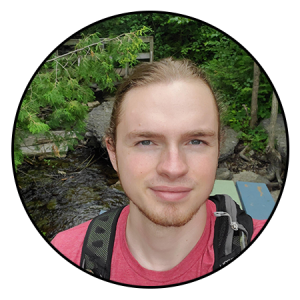 Jacob is a current graduate student at Trent University, where he is completing a Master’s degree in Canadian Studies and Indigenous Studies. As a Trent graduate of psychology and Indigenous studies and current student, Jacob is eager to contribute to a project focusing on health and well-being, as well as Indigenous-settler allyship. His undergraduate research focused on the emerging field of medical humanities, which hopes to provide new frameworks to understand the intersectionality of healthcare experiences and promote wholistic views of healing and medicine. In his current research, Jacob is drawing on his learning about wholistic well-being to reevaluate and decolonize current Western understandings of how humans interact with and connect to the natural environment. He is currently a research assistant in the Nature Relatedness psychology lab as well as a funded graduate researcher in the Health, Environment, and Indigenous Communities Research Group, both at Trent University. Hoping to contribute to the renovation of the master’s house, Jacob recognizes the privilege he comes from as a settler to the Nogojiwanong (Peterborough) area and is incredibly honoured to be a part of such important work.
Jacob is a current graduate student at Trent University, where he is completing a Master’s degree in Canadian Studies and Indigenous Studies. As a Trent graduate of psychology and Indigenous studies and current student, Jacob is eager to contribute to a project focusing on health and well-being, as well as Indigenous-settler allyship. His undergraduate research focused on the emerging field of medical humanities, which hopes to provide new frameworks to understand the intersectionality of healthcare experiences and promote wholistic views of healing and medicine. In his current research, Jacob is drawing on his learning about wholistic well-being to reevaluate and decolonize current Western understandings of how humans interact with and connect to the natural environment. He is currently a research assistant in the Nature Relatedness psychology lab as well as a funded graduate researcher in the Health, Environment, and Indigenous Communities Research Group, both at Trent University. Hoping to contribute to the renovation of the master’s house, Jacob recognizes the privilege he comes from as a settler to the Nogojiwanong (Peterborough) area and is incredibly honoured to be a part of such important work.
On the current project, Jacob served as a graduate student project manager.

